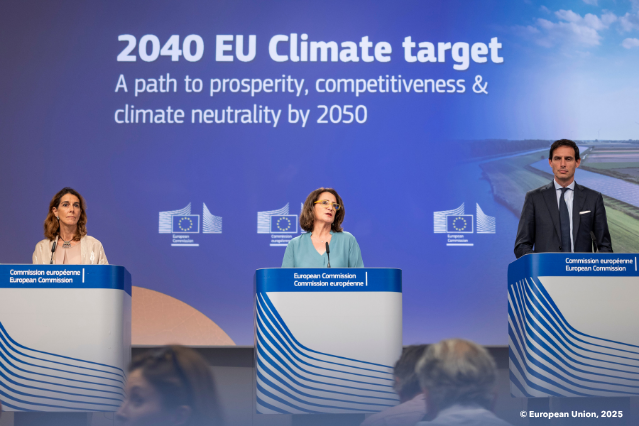
On 2 July, the European Commission presented its long-awaited climate target for 2040, marking a halfway point between the agreed-upon objectives of reducing net greenhouse gas (GHG) emissions compared to 1990 levels by 55% in 2030, and to reach climate neutrality by mid-century. The EU Commission finally settled on a 90% intermediary target after delays, fears of rollbacks and difficult preliminary negotiations. The initial proposal, which will amend the European Climate Law, was expected back in February, alongside the Clean Industrial Deal, the EU’s decarbonisation framework for the mandate. The proposed 90% target introduces increased flexibilities, which have drawn criticism from climate and environment experts.
For the first time, the EU’s carbon emissions reduction target will include several adjustments designed to help Member States meet the objective while allowing them to adapt to the specificities of their economies. First, the Commission’s proposal now allows the use of international credits starting from 2036, permitting Member States to outsource part of their efforts by funding climate projects in developing countries while counting the resulting emissions reduction towards their national targets. However, this mechanism could only account for a maximum of 3 percentage points of the target, with the EU Commission’s Directorate General for Climate (DG CLIMA) set to design the precise rules for how these credits could be used.
In addition, to complement greenhouse gas emissions reduction, the 90% target should also permit the use of domestic permanent removals, both natural and technological, and develop incentives for their use through the 2026 revision of the EU’s Emissions Trading System (EU ETS). This is notably intended to compensate for residual emissions from hard-to-abate sectors and therefore ease the pressure on energy-intensive industries. Lastly, the Commission proposes to increase flexibility across sectors, meaning that a Member State struggling to decarbonise in one area, such as transport or agriculture, could compensate by reducing emissions in another sector instead.
If the European Commission points out that the proposal is based on an in-depth impact assessment and recommendations from both the Intergovernmental Panel on Climate Change (IPCC) and the European Scientific Advisory Board on Climate Change, the latter had strongly advised against the use of international carbon credits in its 2 June report “Scientific advice for amending the European Climate Law: Setting climate goals to strengthen EU strategic priorities”. Major environmental NGOs have also criticised the 2040 target since its publication, arguing it is underwhelming, does not address the urgency of the climate crisis and does not provide sufficient clarity on the new flexibilities proposed.
The Commission's proposal will now be submitted to the ordinary legislative procedure, with the European Parliament and Council working towards adopting a common position on the matter. The discussions between Environment ministers, which observers expect to be heated, could start promptly, with an informal Council meeting scheduled on 10 and 11 July in Denmark, as the country just took over the Presidency of the Council of the EU. The French, Polish, Italian and Czech governments have previously been vocal in their opposition to an overburdening target, as the emissions reduction required to meet it will have repercussions for many industries. In comparison, the 2030 target rested heavily on reducing the power sector’s emissions.
On top of the 2040 target, another difficult negotiation also looms: the presentation of the EU's Nationally Determined Contribution (NDC), the Union’s national climate action plan, as well as the presentation of its 2035 climate target, both required under the United Nations’ (UN) Paris Agreement before the flagship Climate Change Conference, COP30, taking place in Belém, Brazil this November. Poland, Hungary and France called to decouple the 2035 target from the 2040 one, in order to allow for longer negotiations. Still Denmark, which will helm the discussions, aims at delivering both targets in September.